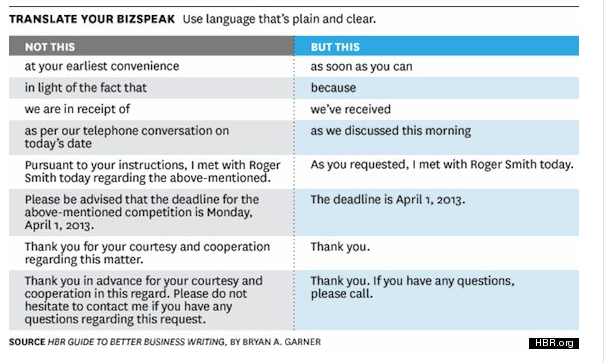|
It's commonly advised "don't mix business with pleasure," which generally means it's not a good idea to date a co-worker. But there are a few words we use for business that also go along with the theme of love. For example, a proposal can be an offer of marriage or a business proposition presented for others to consider. Engagement can mean customers connecting and interacting with a product or website, or the period of time before a marriage takes place where the couple has agreed to marry.
Here's some help pronouncing these two business and love words.
0 Comments
You're talking to your colleague, boss, or team member at work, and you notice that they don't seem to get what you're saying. It might be your accent, but more times than not it is the way you are communicating. Navigating the maze of professional and social communication interactions can be confusing for the non-native English speaker, and even just for those whose strengths lie more in their technical expertise than their people skills. Here are five common mistakes you can fix to improve your success in communication. NUMBER ONE: EASE IN For most interactions, it's not best practice to start the interaction with the main purpose. Rather than telling someone to do something directly, for example, make sure you start with a greeting, compliment, or social question. Your colleague or team member will be more willing and ready to complete the task you are asking them to do if you've had a social exchange first. Even a short hello will smooth the way for your listener to engage with you. Example: You need your team member to give you some completed work. The Error: "Get me the numbers for last quarter." The Fix: "Hi Jim, do you have last quarter's numbers ready for me?" NUMBER TWO: GET TO THE POINT While it’s good to ease in, you also need to be cautious to not take up too much time. If your communication partner wants to have a longer conversation, great, but if you are the only one talking and you could share the same information in one sentence rather than 5, keep it simple. People are busy and don’t want to feel trapped having to politely listen while you lecture. Watch for body language cues (lack of eye contact, crossing arms or turning away) that show your listener would rather move on. Example: You want to tell someone about something you learned. The Error: "Susan, I found a great website. I was looking for an analysis tool for our analytics team to use in conjunction with the current tools and so first I . . . " (ten minutes later, still talking about details of this topic) The Fix: "Hi Susan, how are you? Can I tell you about a website I found that I think you'll find useful? It's an analysis tool - I can send you the link and if you'd like to talk about it more, we could meet for coffee and look at it together." NUMBER THREE: WATCH YOUR RATE In some cultures (including some American subcultures), a fast speaking rate is associated with intelligence. People will speak very quickly and with very few pauses in order to seem knowledgeable or show their expertise on a topic. While a fast rate is not necessarily a problem, if you have speech that is more difficult to understand due to your accent, your word choice or another reason, speaking too quickly can compound the issue. In addition, a lack of pauses can make it difficult for your listener to process all of the information, ask questions or comment and participate in the conversation. Example: You want to teach your team member a better way to do something. The Error: "You need to use a different browser because the one you're using doesn't load as quickly and tends to crash for websites that use Flash, which is a headache by the way because it always needs to update and most people don't keep their updates current for their PC's . . . (continues without pausing)" The Fix: "Hey Amir, I see you're using Safari. Is that your default browser?" pause and wait for response, continue. "Can I show you a better option?" NUMBER FOUR: WHAT IS YOUR BODY LANGUAGE SAYING? Different cultures use different body language to show interest, respect, or give feedback cues. You may be sending a different message than you intend to depending on your body language, or you may be revealing your true attitude when you'd rather keep it to yourself. Understanding body language is key to appropriate interactions, both as the speaker and the listener. Read More About Body Language Here NUMBER FIVE: USE REPAIR STRATEGIES
Even the best communicators can have misunderstandings occur. Sometimes, your listener simply wasn't paying attention and missed what you said. Maybe you used a word or expression they didn't know, or maybe they didn't know what topic you were on and the missed some key information. Whatever the reason, knowing how to identify and repair communication breakdowns is an important skill for any good communicator. Watch for cues that your listener didn't get it (facial expression, body language, off-topic or incorrect response). Don't simply repeat yourself, try re-phrasing, asking a clarifying question, or asking your listener to tell you paraphrase what you've said to make sure the message was clear. Example: You want someone to call you back on your mobile phone. The Error: "Call me back on my mobile, you have that number right?" (no response, or confused response) The Fix: "Oh, I think I wasn't clear. Can I give you my cell phone number to call me back? Can you tell me the number to make sure we have the correct information?" Being proactive as a communicator and looking for ways to be culturally and socially appropriate in your business and social interactions will make you more successful in getting what you need with your colleagues, team member and employers. Good communication opens doors in your career and improves your professional social life. Rather than feeling frustrated by your interactions, take a look at what you can do on your end to improve your communication skills. Many people seeking to improve their American accent are in advanced technical positions. They have expertise in their field, but sometimes find that communication in English is a barrier to success in their career. Whether it is in giving presentations, or communicating on calls and in meetings, they are frustrated by people's inability to understand what they are saying.
Here are some key points to know if you are experiencing difficulty at work due to your accent. 1) Know your audience. When speaking with familiar people, you may find you have no trouble communicating. The people you speak to on a regular basis are used to your accent and the types of technical vocabulary you use. However, when speaking with someone new, especially over the phone or internet, you may need to pay more attention to your speech in order to be understood. Be aware of the types of words you use, and check to make sure your listener is on the same page. 2) Know your issues. This may be a challenge for you, or you may already know which sounds, words, and speaking situations tend to be the most difficult for you. If you are not sure, you can take a free screening or have a full assessment to gain a better understanding of how your individual speech patterns affect your communication in English. 3) Make a commitment to improve. It may seem overwhelming to try to change your accent. But it is likely that if you have been living in North America, your speech has gradually been changing the longer you have been surrounded by American English. You can accelerate and take control of your speech changes by committing to learning your patterns, selecting practice targets and implementing a program for change. You may prefer to do so with direct coaching, or you might like to pursue self-study. To learn more about how to achieve your goals, schedule a free consultation today. Why Speech Modification is an investment you should make in your employees
Sometimes our most valuable resources are employees who speak with non-standard American English pronunciation. Your employee may have the best knowledge, sales skills, technical expertise or leadership potential, but be hampered by his or her ability to use clear and effective communication. Research shows that listeners are biased against speakers with foreign accents, and are less likely to judge the content of their speech as true and correct. People who seek to improve their communication skills with accent modification are more likely to be willing to take on challenges, improve overall productivity and address other areas of professional growth. After completing individualized speech modification training, employees are more confident, more effective in all areas of communication, and more culturally competent. Skills gained are maintained over time and generalize to new contexts. Interpersonal communication, telephone skills and client-facing interactions improve due to improved communication and confidence. An investment for your employees in Speech Modification will benefit all parties involved. Get started today. Do you have a robust vocabulary when speaking English? Knowing the precise words you want to convey your meaning is both satisfying and effective, but beware of overuse of jargon. "Bizspeak," as Harvard Business Review writer Bryan A. Garner dubs it, is the tendency to use buzz words, catch phrases and sometimes meaningless babble rather than simple language. Expressing yourself plainly and clearly using real language is always preferable and will give you more success than overloading your language with unnecessary jargon. For a humorous look at what not to use in your business communication, read his article here.
|
Subscribe to this blog:
Categories
All
Archives
March 2021
Copyright 2020
Christine Dunbar Have Questions?
Get A Free Consultation We offer a free 30-minute phone consultation. Schedule yours now. |







 RSS Feed
RSS Feed



